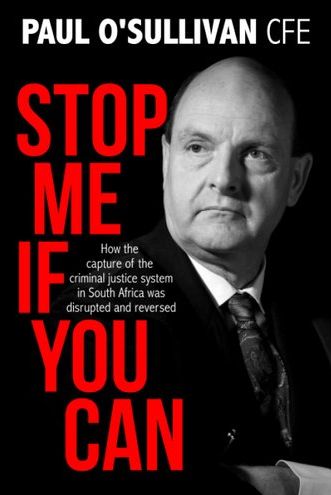
Stop Me if You Can
Original price
R 350.00
-
Original price
R 350.00
Original price
R 350.00
R 350.00
R 350.00
-
R 350.00
Current price
R 350.00
In January 2003, Paul O’Sullivan, then a board member at Airports Company South Africa, opened a criminal docket against Jackie Selebi, South Africa’s chief of police and global head of Interpol, after discovering that Selebi was on the payroll of notorious drug trafficker Glenn Agliotti. In 2010, Selebi was convicted of corruption and sentenced to fifteen years in prison. Released on medical parole, he died at home in 2015 without spending a day in prison.
In May 2012, O’Sullivan uncovered false stories published by the Sunday Times alluding to so-called Zimbabwe renditions. The stories were used to fire good cops, gain control of the police, and capture the South African criminal justice system. In October 2012, O’Sullivan opened a criminal docket against Crime Intelligence boss Richard Mdluli and National Prosecuting Authority (NPA) bosses, Lawrence Mrwebi and Nomgcobo Jiba. Jiba was later fired from the NPA, and both Mrwebi and Mdluli were suspended from their positions. Mdluli went on to be convicted of unrelated offences and was sent to prison.
By early 2016, O’Sullivan’s corruption-busting charity Forensics for Justice had opened no fewer than fifty criminal dockets relating to the underworld capture of the criminal justice system and state-owned companies like South African Airways, the Passenger Rail Agency of South Africa, Eskom and Transnet.
This is the story of how a corrupt police and prosecution service tried desperately to stop O’Sullivan from exposing the dark underbelly of South Africa – and how they ultimately failed. It is the story of a man who, against all odds and at immense personal cost, refused to give up on his quest to turn the tide against corruption. While many of these criminals still walk freely among us today, they will all be held accountable for what they have done – O’Sullivan will make sure of that.
In May 2012, O’Sullivan uncovered false stories published by the Sunday Times alluding to so-called Zimbabwe renditions. The stories were used to fire good cops, gain control of the police, and capture the South African criminal justice system. In October 2012, O’Sullivan opened a criminal docket against Crime Intelligence boss Richard Mdluli and National Prosecuting Authority (NPA) bosses, Lawrence Mrwebi and Nomgcobo Jiba. Jiba was later fired from the NPA, and both Mrwebi and Mdluli were suspended from their positions. Mdluli went on to be convicted of unrelated offences and was sent to prison.
By early 2016, O’Sullivan’s corruption-busting charity Forensics for Justice had opened no fewer than fifty criminal dockets relating to the underworld capture of the criminal justice system and state-owned companies like South African Airways, the Passenger Rail Agency of South Africa, Eskom and Transnet.
This is the story of how a corrupt police and prosecution service tried desperately to stop O’Sullivan from exposing the dark underbelly of South Africa – and how they ultimately failed. It is the story of a man who, against all odds and at immense personal cost, refused to give up on his quest to turn the tide against corruption. While many of these criminals still walk freely among us today, they will all be held accountable for what they have done – O’Sullivan will make sure of that.
